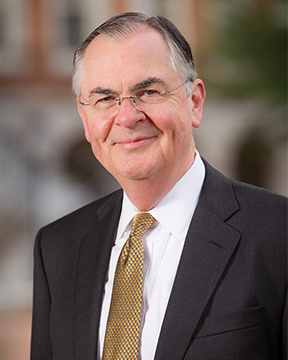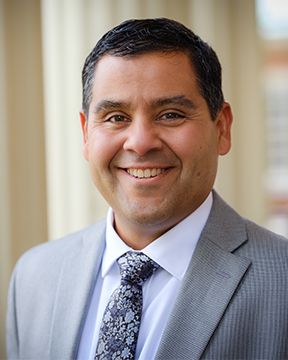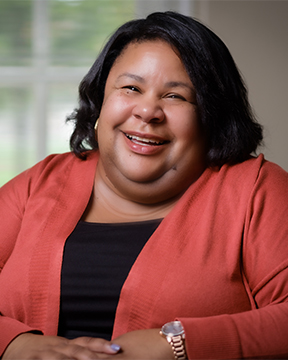WFU shows commitment to diversity and inclusion with new initiatives
Establishing Wake Forest University as a more diverse and inclusive campus that builds bridges in the Winston-Salem community and maintains that commitment is a priority across the University. In 2019, President Nathan O. Hatch created the President’s Commission on Race, Equity and Community to lead this essential work.

Nathan O. Hatch
Co-chaired by José Villalba, vice president for diversity and inclusion and chief diversity officer, and Erica Still, associate dean for faculty recruitment, diversity and inclusion, the Commission shared its final report with the Wake Forest community in June and is now working to implement some of its new initiatives.
Hatch has repeatedly affirmed his commitment to ensuring Wake Forest values everyone — including students, faculty, staff, alumni and Winston-Salem residents. Amid the social unrest that has spilled out onto Winston-Salem streets, in cities across the country and even around the globe, he’s keenly aware that the Commission’s work is now more critical than ever.
“To lead in this regard is not easy, nor is it a temporary focus.” Nathan O. Hatch, Wake Forest president
“As Mary Church Terrell shared, we ‘lift while we climb,’” Hatch said. “I believe that what we have accomplished so far to increase a sense of belonging on campus is neither a beginning nor an end, but rather a continuation of past efforts toward a better future. There is more to come and there is more work to be done.”
Villalba is appreciative of Commission members for their hard work last year but agrees with Hatch that there’s much more work to be done.

José Villalba
“As a University, it is important to recognize the steps that have been taken to address and ameliorate inequities on our campus,” Villalba said. “However, reflection cannot be confused with completion. Equity and inclusion work is not a race to an end, but rather a journey with a purpose — a journey our campus must sustain in order to honor past, current and future members of our community.”
The Commission has outlined several new initiatives to strengthen Diversity and Inclusion at Wake Forest and to create more mutually beneficial community partnerships. Among recommendations of note are: renewed efforts to increase the diversity of incoming first-year classes and financial aid support; implementing training programs to address bias and equity in the hiring process; adding new faculty positions in the African American Studies program; continuing to work with the Freedom School; and actively raising levels of racial sensitivity and awareness in the Law School.
In the aftermath of the Commission, an Advisory Committee on Naming has been created to review and consider recommendations for removing or contextualizing names of University buildings or roadways.
Dean of the Divinity School Jonathan L. Walton, who with former Board of Trustees Chair and Wake Forest alumna Donna A. Boswell is leading this committee, said campus leaders on the President’s Commission on Race, Equity and Community and the Slavery, Race and Memory Project have worked diligently to tell a broader, more inclusive story about the history of Wake Forest. “We must ensure that their work is reflected among the names honored throughout campus,” Walton said.
Leveling the playing field for students, faculty and staff of color is the goal of other new initiatives being undertaken by Wake Forest. For example, the University has renewed diversity and inclusion goals for admissions and financial aid support.
In 2016, Wake Forest University was an inaugural member of the American Talent Initiative, a national program with more than 125 university members that promotes expanding access to highly talented lower-income students. This fall’s first-year class (WFU ‘24) demonstrates important gains among Pell and first generation students, while representation among domestic students of color has increased from 21% to 24%.
Director of Wake Forest University’s Magnolia Scholars program Nate French is glad to see an increased focus on admitting more academically gifted students of color and is excited that the number of first generation students at Wake Forest has also increased.
“The President’s Commission on Race, Equity and Inclusion has impacted faculty and staff, but one of the biggest impacts I have noticed is that the student body now believes that University leaders are being more inclusive and taking diversity seriously.” Nate French, director of the Magnolia Scholars program
As a means of addressing bias and equity in the hiring process, Wake Forest’s Human Resources Department, in collaboration with the Office of Diversity and Inclusion, has developed a suite of inclusive hiring best practices and tools.

Erica Still
“All students, whether white or of color, need to encounter the wide range of intellectual traditions and lived experiences that challenge many of the ideas they find in the broader culture, and faculty and staff of color help expand those horizons of possibility,” Still said.
To that end, over the summer Corey D.B. Walker was hired as the inaugural chair of Wake Forest’s African American Studies program. Previously, he was a visiting professor of leadership studies and the humanities at the University of Richmond and a former dean at Winston-Salem State University.
“The new African American Studies program represents an important step forward,’’ Still said. “The expansion of our academic efforts toward diversity, inclusion and equity offers students additional critical frameworks through which they can interrogate our social, political and cultural norms, and generates new ways of approaching them. That’s empowering for students, and it further equips them to be the engaged community leaders we need.”
Still also cited University support for the Freedom School, a program for elementary and middle-school students aimed at strengthening children’s reading skills and closing achievement gaps. Wake Forest’s program is part of a national initiative developed by the Children’s National Defense Fund and is led by Executive Director Danielle Parker Moore, an assistant professor of education.
“We all know the difference access to a quality education makes, and the Freedom School expands that access,” Still said. “Even if in only subtle ways, having these young students on campus during the summer lets them envision themselves as belonging in academic spaces, and that matters. If we’re lucky, some of them will become Wake Forest students, bringing with them all of their gifts and experiences to enrich our community.”
Kami Chavis, associate provost for academic initiatives and co-chair of Wake Forest’s Slavery, Race and Memory Project, said the University is taking some bold but necessary steps at a critical juncture in our nation’s history.
“The last few months have highlighted the structural disparities and racism that persist in our country,” Chavis said. “Universities play a critical role in educating future leaders, and we hope that the steps we are taking will play a significant role in addressing these large issues.”
Categories: Inclusive Excellence

